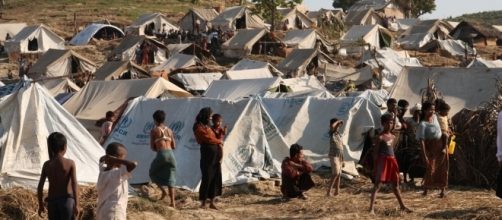The Myanmar government recently received criticism from the United Nations (UN) for the actions taken toward the Rohingya — the name for the Muslim immigrants within the nation — within the state of Rakhine. On the 25th of August, violence between the Rohingya militia and the security forces in the country broke out in Rakhine, resulting in the death of 12 Myanmar security personnel. In response, the government has decided to take military action against this militia.
The Myanmar government considers their military action to be a response to the violence of the opposing Rohingya militia.
However, the UN and many other critics see recent events within the state as “ethnic cleansing” aimed at eliminating the Muslim minority. Reports from those fleeing Myanmar describe the actions of the government which included the burning of Rohingya villages and the targeting of civilians. This has led to the labeling of these actions as a “genocide” by the current Human Rights Chief in the UN, Zeid Ra’ad al Hussein, reported Al Jazeera News.
Zeid Ra’ad al-Hussein told the United Nations Human Rights Council in Geneva that more than 270,000 people had... https://t.co/U9LzFDGSc6
— Aissam Kakri (@aissamkakrii) September 11, 2017
Human rights and the Rohingya population
The Rohingya have been a deeply persecuted group throughout Myanmar, a country dominated by mostly people following the Buddhist faith.
Responding to this persecution, the Rohingya militia was created as a protection against Myanmar security forces as they believe that the creation of a militia is the only way to secure Rohingya safety within the nation. However, after the events on the 25th of August, the Myanmar government has apparently been targeting civilians, leading to an eruption of violence within the nation.
Many believe this response to the event in August is simply an excuse for the genocide of a people who have long been oppressed because of their minority and immigrant status. Many citizens of the country believe these Muslim immigrants to be unwelcome immigrants. According to reports by Al Jazeera News, Abul Hassan Mahmood Ali, a diplomat serving as the Minister of Foreign Affairs in Bangladesh, stated that the actions taken in Myanmar are a sort of “revenge” in response to the events in August.
UN Human Rights Chief, Zeid Hussein, argues that the action taken by the Myanmar government is “disproportionate,” says BBC News. In other words, the actions taken after the events on the 25th of August have not considered the magnitude of the crime. Rather than attempting to serve justice to those involved, the government has decided to punish all those who side with the Rohingya militia. The result of this “disproportionate” action has been criticism from many world leaders, such as the human rights chief in the UN, who reportedly the actions resemble "a genocide."
Criticism of the Myanmar government and its leader
In light of the persecution of the Muslim minority, and the fleeing of approximately 300,000 refugees to Bangladesh, head of the Human Rights Commission of Bangladesh, Kazi Reazul Hoque, had much to say about the genocide.
Reported by Al Jazeera Today, he stated, “the way the genocide has been carried out in Myanmar, the way the people were killed in arson attacks, we are thinking about pressing for a trial against Myanmar, and against the Myanmar army, at an international tribunal.”
Charges such as these could result in the reestablishment of sanctions on the country if an international organization, like the UN, decides that the country’s government is responsible for committing genocide. A punishment such as this could result in the decline of the Myanmar’s economy. It is just a year since its past sanctions were released following the actions of de facto leader Aung San Suu Kyi which brought democracy to the nation.
Criticism has not only been aimed at the government as an entity. In some cases, it has been aimed at Suu Kyi herself. A Nobel Peace Prize winner, she has had little to say on the action taken toward the Rohingya people within her country, telling the media that a “huge iceberg of misinformation” is misconstruing the current situation in Myanmar. Recently, Suu Kyi had told Turkish President, Recep Tayyip Erdogan in a phone call, “we make sure that all the people in our country are entitled to the protection of their rights as well as the right to, not just political, but social and humanitarian defense.”
This statement is supposedly a direct quotation from the conversation with Myanmar leader, according to Al Jazeera.
Her statements have not protected her from the onslaught of criticism, including statements from fellow Nobel Peace Prize winners like Malala, saying she is “waiting” for Suu Kyi to “condemn” the treatment of the Rohingya people.
My statement on the #Rohingya crisis in Myanmar: pic.twitter.com/1Pj5U3VdDK
— Malala (@Malala) September 3, 2017
Creation of a global community against the genocide
The President of Bangladesh has called upon the “international community to come forward with their help,” regarding the hundreds of thousands of refugees.
In the face of such conflict, it is difficult as an individual to understand what role to take when not directly involved. However, simply staying informed and attempting to inform others results in a community that may speak in opposition to the unfair treatment of the Rohingya or any other group in need of aid. If one cannot influence the outcome of a situation directly, they most certainly can influence the situation indirectly through their power to influence those who surround them.


